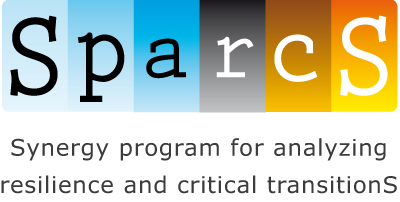brain disorders
Excitability of neurons is a vital characteristic of the functioning of the brain. However, in a considerable fraction of the world population some form of excessive excitability leads to disorders such as migraine and epilepsy. The positive feedback that drive the system into an acute phase is relatively well understood in migraine with aura. In this disorder migraine attacks follow a scintillating visual distortion (the aura) corresponding to a wave of autonomous firing that slowly travels over the cortex known as a cortical spreading depression.
With Michel Ferrari and his team we work on understanding the onset of this phenomenon as a critical transition, and to find generic indicators of resilience of the brain that may serve as warning signals, but will also enhance our capacity to detect factors that cause this resilience to differ between persons and vary over time.
Key reference:
Migraine Strikes as Neuronal Excitability Reaches a Tipping Point
PLoS ONE 8 (8):art. no. e72514 [full text]
mood disorders
While mood disorders involve the brain, they can be better understood from interactions with other physiological systems as well as with behavior and social interactions. This has invoked researchers to develop a network model for diseases such as generalized depression and bipolar disorder where ‘symptoms’ may themselves have an effect on the system, thus causing feedback. For instance, a depressed mood may cause subjects to become less active, have less physical exercise, and see less friends, but each of these behavior changes will tend to affect mood negatively too, thus creating a positive feedback that may drive a subject further into the depressed state.
We work with a team of psychologists and psychiatrists on constructing network models of depression and other psychiatric disorders, that can better explain tipping points and transitions. Moreover we analyze data to find indicators of resilience that are predictive of how close a subject is to a transition.
Key references
Critical slowing down as early warning for the onset and termination of depression
van de Leemput, I.A., Wichers, M., Cramer, A.O.J., Borsboom, D., Tuerlinckx, F., Kuppens, P., van Nes, E.H., Viechtbauer, W., Giltay, E.J., Aggen, S.H., Derom, C., Jacobs, N., Kendler, K.S., van der Maas, H.L.J., Neale, M.C., Peeters, F., Thiery, E., Zachar, P. & Scheffer, M. (2013)
Proceedings of the National Academy of Sciences [Full text]
A Dynamical Systems View of Psychiatric Disorders – Theory: A Review
Scheffer, M., Bockting, C.L., Borsboom, D., Cools, R., Delecroix, C., Hartmann, J.A., Kendler, K.S., Van De Leemput, I., Van Der Maas, H.L.J., Van Nes, E., Mattson, M., McGorry, P.D. & Nelson, B. (2024)
JAMA Psychiatry [full text]
A Dynamical Systems View of Psychiatric Disorders – Practical Implications: A Review
Scheffer, M., Bockting, C.L., Borsboom, D., Cools, R., Delecroix, C., Hartmann, J.A., Kendler, K.S., Van De Leemput, I., Van Der Maas, H.L.J., Van Nes, E., Mattson, M., McGorry, P.D. & Nelson, B. (2024)
JAMA Psychiatry [full text]
the gut ecosystem
Our body hosts ten times more bacterial cells than we have body cells, and these bacteria have a collective genome that is about 150 more extensive than the human genome. We depend on these microbes in many ways, and this is especially so for the guts, which contain an ecosystem with numerous species of bacteria and other microorganisms that interact in complex ways with the host. One recent finding is that the gut ecosystem can be in contrasting states. There are globally roughly three ‘entero-types’ that could represent alternative stable states, but more subtypes appear to exist, and various diseases are associated to particular low-diversity states of the gut ecosystem. Although this ecosystem is still poorly understood, is has become clear that the state of the gut flora is linked to diseases ranging from irritable bowel syndrome and Crohn’s disease to psychiatric disorders.
With Willem de Vos, Leo Lahti and others we work on understanding what determines the stability of the alternative states, and how their resilience is affected by diet, genetics and other factors.
Key reference:
Tipping elements in the human intestinal ecosystem
Lahti, L., Salojärvi, J., Salonen, A., Scheffer, M. & De Vos, W.M. (2014)
Nature Communications 5 [Full text]
frailty syndrome
Several, if not all of the elements of our health are linked, for instance through a common demand for energy. The linkage of health elements becomes especially apparent in the elderly, where an overall state of low resilience is known as the frailty syndrome. Recovery processes become slower, and disturbances of one subsystem propagate more easily to cause malfunctioning of other elements of the body.
We work with Marcel Older Rikkert and others on understanding frailty and tipping points in the elderly. Meanwhile we cooperate with Jaap Bakker and Jan Kammenga to study death and frailty in the nematode Caenorhabditis elegans as a model organism.
Key references
Dynamical Indicators of Resilience in Postural Balance Time Series Are Related to Successful Aging in High-Functioning Older Adults
Gijzel, S.M.W., Van De Leemput, I.A., Scheffer, M., Van Bon, G.E.A., Weerdesteyn, V., Eijsvogels, T.M.H., Hopman, M.T.E., Olde Rikkert, M.G.M. & Melis, R.J.F. (2019)
Journals of Gerontology – Series A Biological Sciences and Medical Sciences 74 (7):1119-1126 [full text]
Resilience in Clinical Care: Getting a Grip on the Recovery Potential of Older Adults
Gijzel, S.M.W., Whitson, H.E., van de Leemput, I.A., Scheffer, M., van Asselt, D., Rector, J.L., Olde Rikkert, M.G.M. & Melis, R.J.F. (2019)
Journal of the American Geriatrics Society [full text]
Quantifying resilience of humans and other animals
Scheffer, M., Elizabeth Bolhuis, J., Borsboom, D., Buchman, T.G., Gijzel, S.M.W., Goulson, D., Kammenga, J.E., Kemp, B., van de Leemput, I.A., Levin, S., Martin, C.M., Melis, R.J.F., van Nes, E.H., Michael Romero, L. & Olde Rikkert, M.G.M. (2018)
Proceedings of the National Academy of Sciences of the United States of America 115 (47):11883-11890 [full text]
Dynamical Resilience Indicators in Time Series of Self-Rated Health Correspond to Frailty Levels in Older Adults
Gijzel, S.M.W., Van De Leemput, I.A., Scheffer, M., Roppolo, M., Olde Rikkert, M.G.M. & Melis, R.J.F. (2017)
Journals of Gerontology – Series A Biological Sciences and Medical Sciences 72 (7):991-996 [full text]
Slowing Down of Recovery as Generic Risk Marker for Acute Severity Transitions in Chronic Diseases
Olde Rikkert, M.G.M., Dakos, V., Buchman, T.G., Boer, R.D., Glass, L., Cramer, A.O.J., Levin, S., Van Nes, E., Sugihara, G., Ferrari, M.D., Tolner, E.A., Van De Leemput, I., Lagro, J., Melis, R. & Scheffer, M. (2016)
Critical Care Medicine 44 (3):601-606 [full text]

